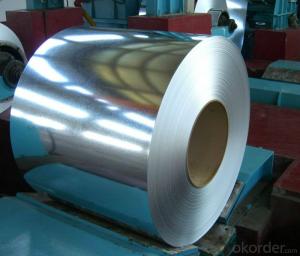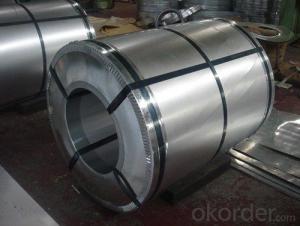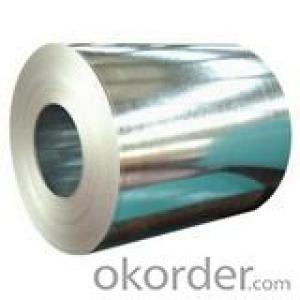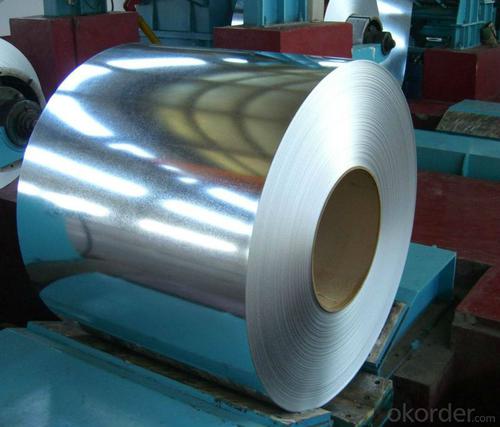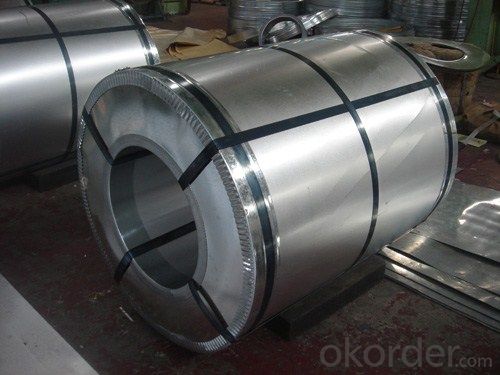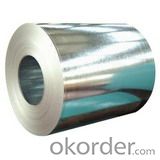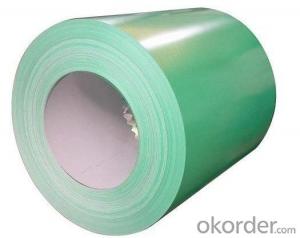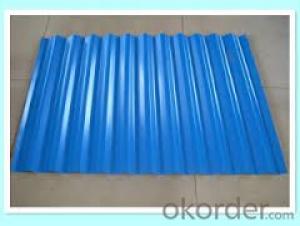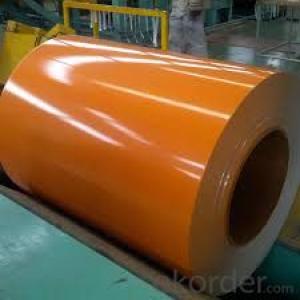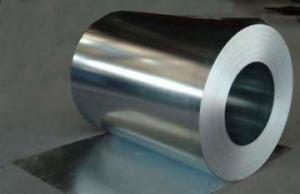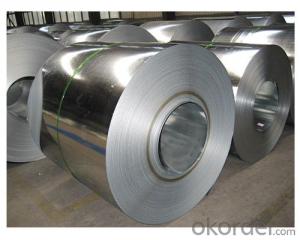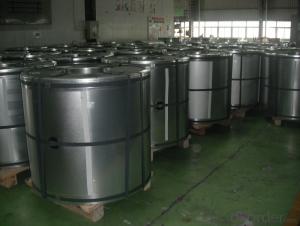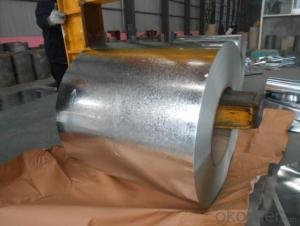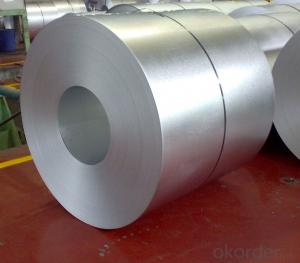Galvanized Steel Sheet in Ciols with Prime Quality
- Loading Port:
- Shanghai
- Payment Terms:
- TT OR LC
- Min Order Qty:
- 50 m.t.
- Supply Capability:
- 1000 m.t./month
OKorder Service Pledge
OKorder Financial Service
You Might Also Like
1.Structure of Galvanized Steel Coil Description:
Hot-dip galvanized steel coils are available with a pure zinc coating through the hot-dip galvanizing process. It offers the economy, strength and formability of steel combined with the corrosion resistance of zinc. The hot-dip process is the process by which steel gets coated in layers of zinc to protect against rust. It is especially useful for countless outdoor and industrial applications.
2.Main Features of the Galvanized Steel Coil:
• Base material for countless outdoor and industrial applications
• High corrosion resistance
• High strength
• Good formability
• Rust- proof ability
• Good visual effect
3.Galvanized Steel Coil Images
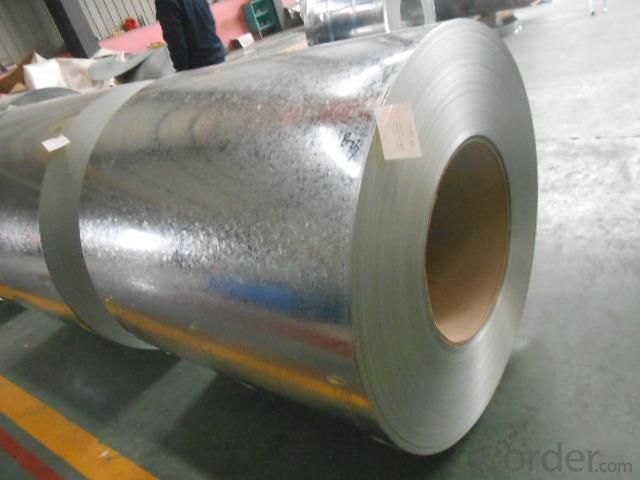
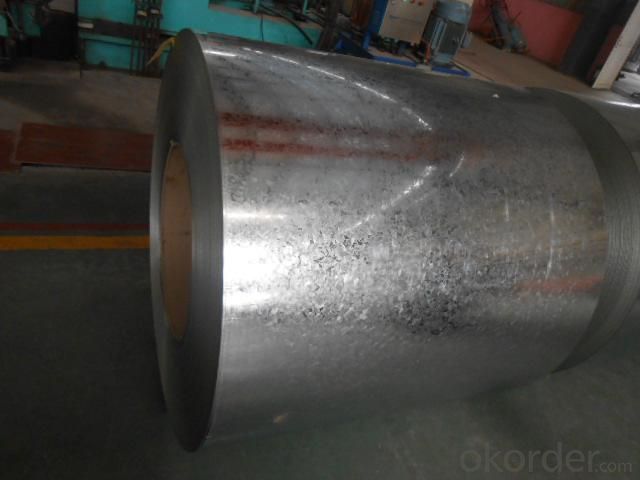
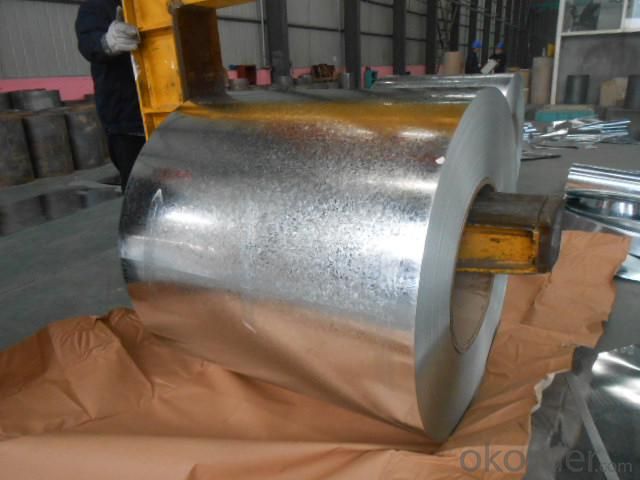
4.Galvanized Steel Coil Specification
Operate Standard: ASTM A653M-04/JIS G3302/DIN EN10143/GBT 2518-2008
Grade : SGCD,SGCH, Q195,DX51D
Zinc coating :40-180g( as required)
Width:914-1250mm(914mm, 1215mm,1250mm,1000mm the most common)
Coil id:508mm/610mm
Coil weight: 4-10 MT(as required)
Surface: regular/mini/zero spangle, chromated, skin pass, dry etc.
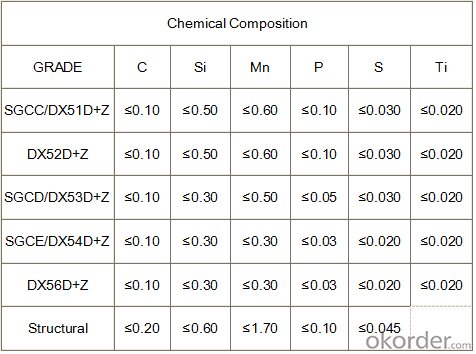
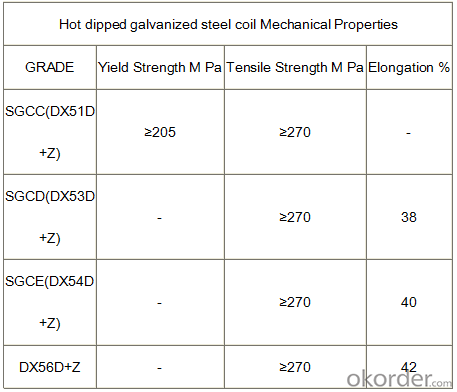
5.FAQ of Galvanized Steel Coil
We have organized several common questions for our clients,may help you sincerely:
1.How to guarantee the quality of the products?
We have established the international advanced quality management system,every link from raw material to final product we have strict quality test;We resolutely put an end to unqualified products flowing into the market. At the same time, we will provide necessary follow-up service assurance.
2. What is the minimum order quantity ?
Our MOQ is 50mt for each size. And we will consider to give more discount if you make big order like 1000 tons and more. Further more, the more appropriate payment term your offer the better price we can provide.
3.How long can we receive the product after purchase?
Usually within thirty working days after receiving buyer’s advance payment or LC. We will arrange the factory manufacturing as soon as possible. The cargo readiness usually takes 15-25 days, but the shipment will depend on the vessel situation.
- Q: if steel is heated from room temperature (20c) to (500c) what would be the change in density?coefficient for linear expansion of steel 12x10^-6 k density of steel 7800 kg
- First you have to convert the coefficient of linear expansion to a coefficient of volumetric expansion. Multiply the coefficient of linear expansion by 3: Coefficient of expansion of steel,β:12E-6/°K x 3 = 36E-6/°K Difference in temperature: 480°K ΔV = VoβΔT ΔV = Vo x (0.000036) x 480 ΔV = 1m? x 0.017 ΔV = 0.017m? Originally, the steel was at 7800 kg/m? Now, the steel was at 7800 kg/ 1.017m?, or 7670 kg/m? Change in density = 7670 - 7800 = -130kg/m?
- Q: How are steel coils used in the production of industrial storage tanks?
- Steel coils are commonly used in the production of industrial storage tanks due to their superior strength and durability. These coils are typically made from high-quality steel that is rolled into a coil shape, allowing for easy transportation and handling. In the production process, steel coils are first uncoiled and flattened to create sheets of steel. These sheets are then cut and formed into the desired shape and size for the storage tank. The steel sheets are welded or bolted together to create the tank's body, which is designed to withstand high pressure and heavy loads. The use of steel coils in the production of industrial storage tanks offers several advantages. Firstly, the strength and durability of steel ensure that the tanks can withstand harsh conditions and are resistant to corrosion. This is particularly important for storage tanks that may contain corrosive substances or be exposed to harsh environments. Additionally, the flexibility of steel coils allows for customization of the tank's design and size. This is particularly beneficial in industries where storage requirements can vary significantly, such as the oil and gas industry. Steel coils can be easily cut and formed into various shapes and sizes, enabling the production of storage tanks that meet specific storage needs. Furthermore, steel coils can be easily transported and stored, making them a cost-effective choice for the production of industrial storage tanks. The coils can be efficiently transported to the manufacturing facility, reducing transportation costs and logistical complexities. Overall, steel coils play a crucial role in the production of industrial storage tanks by providing strength, durability, and customization options. Their use ensures that the tanks can safely store and protect various substances, making them essential for a wide range of industries.
- Q: looking to buy a sashimi knife. what is the difference between white steel (1and2) and blue steel (1and2) in terms on characteristics. what gets sharper? what holds edge longer? basically any info on the pros and cons of each steel would be SO GREATLY APPRECIATED! thanks in advance to all who answer. i'm leaning towards white-2 steel for my first sashimi knife, started training on the sushi bar and need a new tool!
- Steel Sushi
- Q: How are steel coils used in the manufacturing of transmission systems?
- Steel coils are used in the manufacturing of transmission systems as they are shaped and formed into various components such as gears, shafts, and bearings. These components provide strength, durability, and precision to the transmission system, ensuring smooth power transfer and efficient operation of vehicles and machinery.
- Q: What are the common applications of coated steel coils?
- Coated steel coils find a wide range of applications in various industries due to their excellent properties and versatility. Some of the common applications of coated steel coils include: 1. Construction: Coated steel coils are extensively used in the construction industry for roofing, cladding, and wall panels. The coating provides superior corrosion resistance, weatherability, and durability, ensuring long-lasting structures. 2. Automotive: Coated steel coils are widely used in the automotive industry for manufacturing components such as body panels, bumpers, and chassis parts. The coatings enhance the aesthetics, provide protection against corrosion, and improve the paint adhesion for a flawless finish. 3. Appliances: Coated steel coils are utilized in the production of household appliances like refrigerators, washing machines, and ovens. The coatings provide a smooth, attractive finish and protect the steel from moisture and other environmental factors. 4. HVAC Systems: Coated steel coils are commonly used in Heating, Ventilation, and Air Conditioning (HVAC) systems for manufacturing ductwork, air handling units, and heat exchangers. The coatings ensure resistance against corrosion and improve the overall efficiency of the system. 5. Furniture: Coated steel coils find application in the furniture industry, where they are used for manufacturing cabinets, tables, and chairs. The coatings provide a decorative finish while protecting the steel from wear and tear. 6. Electrical equipment: Coated steel coils are utilized in the production of electrical equipment such as switchboards, control panels, and enclosures. The coatings provide insulation and protection against electrical conductivity while ensuring durability. 7. Packaging: Coated steel coils are used in the packaging industry for manufacturing cans, containers, and closures. The coatings act as a barrier against moisture and prevent contamination, ensuring the preservation and safety of the packaged products. In conclusion, coated steel coils have numerous applications across various industries due to their corrosion resistance, durability, aesthetics, and protective properties. From construction to automotive, appliances to furniture, and even in electrical equipment and packaging, coated steel coils play a crucial role in delivering high-quality products and ensuring long-lasting performance.
- Q: What are the common methods of joining steel coils?
- The common methods of joining steel coils include welding, mechanical fastening (such as bolts or screws), and adhesive bonding.
- Q: How are steel coils processed for slitting or shearing?
- Steel coils are processed for slitting or shearing by feeding the coil through a slitter or shear machine, which cuts the coil into narrower strips or various shapes, respectively. This process involves unwinding the coil, straightening it, and then passing it through the slitting or shearing machine, where precise cuts are made according to the desired dimensions. The resulting strips or shapes are then collected and packaged for further use or distribution.
- Q: If I wear a pair of thick wool socks, is walking around in the snow with steel-toed boots going to be a problem? I'm wondering if the steel will make my toes too cold.
- should be ok and not cold if you go by what is written in the posting you quoted however if you are thinking of buying them just for the snow i would consider something else much cheaper. however if you already have them then not a problem, i suggest you give it a test run.
- Q: How are steel coils used in the production of electronic devices?
- Steel coils are used in the production of electronic devices in a variety of ways. One common use is in the manufacturing of transformers and inductors, which are crucial components in many electronic devices. Transformers and inductors consist of a coil of wire wound around a core, and steel coils are often used as the core material due to their magnetic properties. The steel coils used in these components help to enhance the magnetic fields generated by the coils, enabling efficient energy transfer and voltage regulation. The magnetic properties of steel, such as its high permeability and low hysteresis loss, make it an ideal material for these applications. Additionally, steel coils are also used in the production of printed circuit boards (PCBs). PCBs are the backbone of most electronic devices and consist of a flat board made of non-conductive material, such as fiberglass, with a thin layer of copper traces etched onto it. These copper traces form the electrical connections between various components on the board. Steel coils are used in the production of PCBs as part of the fabrication process. They are typically used to create the stencils that are used to apply solder paste onto the board before component placement. The steel coils are laser-cut to create precise stencil patterns, allowing for accurate and consistent solder paste application. In summary, steel coils play a vital role in the production of electronic devices. They are used in the manufacturing of transformers and inductors, where their magnetic properties enhance energy transfer and voltage regulation. Steel coils are also utilized in the fabrication of PCBs, where they are used to create stencils for solder paste application. Overall, the use of steel coils helps ensure the efficient and reliable operation of electronic devices.
- Q: How are steel coils inspected for elongation?
- Steel coils are inspected for elongation using a variety of methods. One common method is the use of a tensile testing machine. In this method, a small sample is taken from the steel coil and placed into the machine. The machine then applies a pulling force to the sample until it breaks. The amount of force required to break the sample is measured, and this information is used to determine the elongation of the steel coil. Another method used to inspect steel coils for elongation is the use of ultrasonic testing. In this method, high-frequency sound waves are passed through the steel coil. By analyzing the reflection of these sound waves, it is possible to determine the elongation and other properties of the steel coil. Visual inspection is also an important aspect of inspecting steel coils for elongation. Trained technicians visually inspect the steel coils for any signs of stretching or deformation that may indicate excessive elongation. Overall, a combination of mechanical testing, ultrasonic testing, and visual inspection is used to thoroughly inspect steel coils for elongation and ensure their quality and compliance with industry standards.
Send your message to us
Galvanized Steel Sheet in Ciols with Prime Quality
- Loading Port:
- Shanghai
- Payment Terms:
- TT OR LC
- Min Order Qty:
- 50 m.t.
- Supply Capability:
- 1000 m.t./month
OKorder Service Pledge
OKorder Financial Service
Similar products
Hot products
Hot Searches
Related keywords
